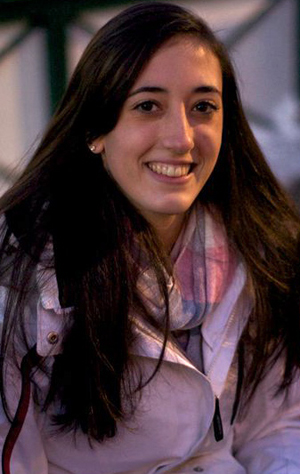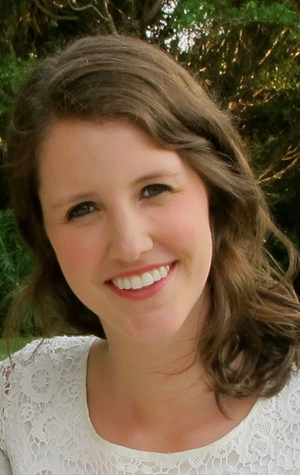Summer Interns Look Back
Advice on how to find internships, importance of staying in touch

Time was the word intern conjured up an image of a frantic-looking college student, clipboard in hand, standing in line at Starbucks to fetch steaming lattes, cappuccinos, and Americanos for their bosses. If you were lucky, you might get to answer phone calls or do some filing.
Happily, today many internships offer far more hands-on learning. We recently spoke with three BU seniors about their summer internships—experiences they say proved eye-opening. Whether they were testing recipes, handling medical equipment, or interacting with famous celebrities, these students received an insider’s look at what their future might hold.
And they were in good company. According to the National Association of Colleges and Employers (NACE), more than 55 percent of the Class of 2012 interned at some point during their college career. While nearly half of those internships (47 percent) were unpaid, the good news is that the majority of companies surveyed by NACE (58.6 percent) reported offering their interns full-time positions, an all-time high figure. These statistics underscore just how important internships have become in finding postgrad employment.
BU Today asked the three students—each from a different school—how they found their positions, the importance of interning before graduation, and advice for students seeking summer employment. As you can see from their comments, the time to start applying for a summer internship is now.
Lynne Messina (ENG’13)
Messina spent the summer as a quality engineering intern at medical technology firm St. Jude Medical, in Westford, Mass. She worked in a lab setting, assisting her supervisor in analyzing such things as human blood and life-saving cardiovascular devices, helping to ensure that her company provided hospitals with the highest quality materials. Understanding how complex the process is—from the preliminary design of a medical device to regulatory affairs to group financing—was a revelation, she says.
Allison Milam (CAS’13, COM’13)
Milam worked this past summer as an online editorial intern at the Food Network in New York. There she focused primarily on writing for the network’s website, where she contributed blog posts for the “Healthy Eats” section, created photo galleries, and even tested recipes. “I’ve looked at more hot dog or hamburger recipes than I ever thought possible,” she jokes. A standout moment during the summer, she says, was making eye contact with Food Network star and restaurateur Bobby Flay.
Peter Schratz (SHA’13)
Schratz worked as a front-of-house intern at the Ritz-Carlton, Boston Common. Although he rotated through different departments, learning about various aspects of the hotel business, Schratz says he primarily assisted guests as either a front desk agent or a club lounge concierge. In those capacities, he assisted several well-known actors and athletes from pro sports teams (whose names, unfortunately, he is not allowed to disclose). Guaranteeing that all of the guests had memorable stays by offering top-notch service was the most gratifying part of the job, he says.
BU Today: What attracted you to your particular internship? How did you find it?
Messina: I wanted to be part of a medical device company that deals with the heart, because that’s the type of research and work I want to do in the future. I actually found the position online at internships.com back in March.

Milam: Before Food Network, I worked as a freelance food writer for a magazine, was the food editor for BU’s Buzz magazine, and helped out with Tasted Menu, a Boston-based restaurant review site. I also have a food blog, which I basically use to relive all of my best meals. Applying for a gig like the one at Food Network just seemed like a good next step. I got in contact with Scripps Networks Interactive before I went on a Study Abroad semester to London last spring, and after going through a few rounds of phone interviews and doing an edit test, I had the internship nailed down last November.
Schratz: I’ve wanted to intern at the Ritz-Carlton since I came to BU, and it was exactly the type of position I was looking to apply for. I was fortunate enough to know a supervisor at the Ritz-Carlton, Boston Common, who went to BU. She reached out to me during spring semester about the position being available.
Did you have any particularly interesting experiences?
Messina: The craziest thing about the summer was dealing with people’s blood, and knowing that the devices I was analyzing were previously used to help save a life. Knowing that the equipment I was handling impacted so many people meant a lot to me and the work that I did.
Milam: I got to go up to the Food Network test kitchens to try recipes for the website. The kitchens were pristine, state-of-the-art, and bustling with chefs trying out every recipe you could imagine—from barbecue to Bolognese sauce. With every bite, we discussed with the chefs what could be changed, what we loved, and whatever else we were thinking. In a single week, I tried three different batches of chocolate swirl banana bread, since the chefs had to bake it until it reached perfection.
Schratz: Working in a hotel, you get to meet a ton of interesting people, especially because summer is peak season for Boston hotels. A lot of celebrities would stay with us, and it was really nice to see them on such a real level, just as normal people. Getting to know guests from all over the country and hearing their stories was definitely the best part of the job.
How important are summer internships in building a career?
Messina: I think they’re very important. They help you to figure out what you like and don’t like before you dive into your first job. They’re also helpful in networking and getting your name out there.
Milam: I spent the summer after my freshman year at SRQ Magazine in Sarasota, Fla., and ended up staying with the company for three years. I can honestly say that I wouldn’t have plunged into food media if it wasn’t for that first step. Without that experience—and the tear sheets that came with it—the internship at Food Network wouldn’t have happened. Classes are invaluable, but internships and jobs are where you lay the foundation for big breaks.

Schratz: I think they’re so important. First of all, they give you some idea if you are on the right career path—because taking classes and working are so different—and you don’t want to find out after graduation that you don’t even like working in that field. I also think an internship gives you experience you can use in interviews and opportunities to network and meet people who can help you out when you graduate. I think they can make or break your postgrad job hunt.
Will you stay in touch with your employer? If so, how do you plan to do it?
Messina: Yes, I definitely think I will. I made a lot of good relationships this summer and hope to keep them in the future. I have everyone’s email and phone number, as well as letters of recommendation, so I hope to remain in contact with them during senior year.
Milam: Since I left New York City, I’ve been working on freelance blog posts for Food Network’s FN Dish. It’s been a nice way of maintaining that connection to the company and it’s definitely kept me in the groove. I’ve been in contact with my employers through email, but I’ve also added a few of them on LinkedIn.
Schratz: Absolutely. I’m actually continuing my internship during the school year. Even if I do end up leaving the internship before I graduate, I’ll continue to meet up with my coworkers and bosses to keep in touch. I feel invested in the Ritz-Carlton, and I’ll want to know how everyone is and how things are going. I’ll also want to keep in touch with them so they can give me some advice once I graduate.
What advice would you give students seeking summer internships?
Messina: I applied to about six internships and heard back from only one, so I’d say apply to all you think could work for you. It’s supercompetitive, but it’s absolutely worth it in the end. The relationships you make are worth a lifetime and will be extremely helpful for the future. It’s a decision you won’t regret.
Milam: The internship search takes time and perseverance, but sometimes you land the internship you’ve been waiting for. Do whatever you can to build your portfolio and don’t be afraid to show it to people. Also, don’t shoot for the big guys from the very beginning. Start small and throw yourself into it, whether it’s a publication back home, a start-up, or a blog. Be sure to take advantage of the online and print publications that BU has to offer.
Schratz: Give it a real shot. If it isn’t the most glamorous job right away, that doesn’t mean it isn’t for you. You have to start somewhere, and it takes patience and hard work. I think it pays off and earns you a lot of respect. It’s only temporary, so if you still don’t like it by the end, at least you learned what isn’t for you. Every internship is a learning experience—whether good or bad.
Tom Vellner can be reached at tvellner@bu.edu; follow him on Twitter at @tomgvellner.
Comments & Discussion
Boston University moderates comments to facilitate an informed, substantive, civil conversation. Abusive, profane, self-promotional, misleading, incoherent or off-topic comments will be rejected. Moderators are staffed during regular business hours (EST) and can only accept comments written in English. Statistics or facts must include a citation or a link to the citation.